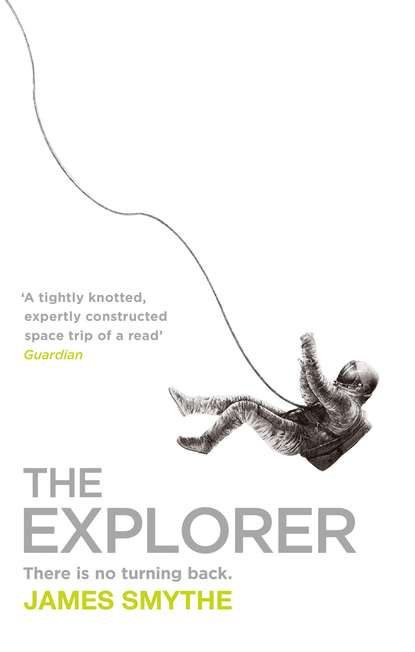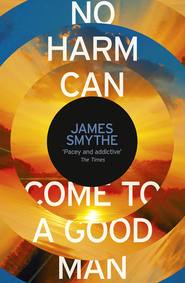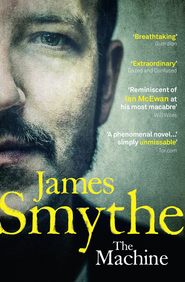По всем вопросам обращайтесь на: info@litportal.ru
(©) 2003-2024.
✖
The Explorer
Автор
Год написания книги
2018
Настройки чтения
Размер шрифта
Высота строк
Поля
Starting up again by pressing a button is anticlimactic, but it’s a necessity: the air is getting thin, and my headaches have gotten worse. I have stopped complaining about them – they are just there now, just something I can’t really do anything about. I never even asked Emmy if I could take a tablet for them before she died. There’s a cupboard full of medicines if I need them: I’m sure an aspirin won’t do me any harm. The cupboard carries everything, every sort of pill, like a tiny pharmacy, prepared for any eventuality. They didn’t save any of the crew. I press the button and the engines whir into place and we chug off, a steam train. There’s no concept of the speed we’re actually going right now. You can’t look out of the window and see the stars whizzing by. There are no markers or reference points; there’s just the darkness of space.
3
I slept heavily last night, and I ache when I wake up. I think that my sleeping patterns are fucked up, that I’m not sleeping at night, or what should be night. The not-day. I don’t actually know if it was night-time, not really. The clocks say something different to what I feel it is anyway. They’re all on Earth time, to acclimatize us, to help for when we made contact. Up here, it’s totally different. Twelve hours can feel like a lifetime. I wake up to the beeping again, 250480, little red light, and it takes me a few minutes (that I spend typing the number into the computer again, hoping that it might suddenly work out what I was asking, searching around it, yawning) to notice the fuel gauge. 25%, a full 2% lower than when I went to bed. I sit and watch the screen again, bringing up the detailed analysis. This can’t be right. Each percentage of fuel has its own smaller percentage, a mini-countdown, and it is ticking swiftly, a percentage point every couple of minutes. Something’s wrong, or more wrong, worse than it was before. We seem to be losing fuel at an accelerated rate. I don’t know why, and it hurts to be this clueless.
In one of Emmy’s videos she spoke about the worst moment of her career: treating a patient with internal bleeding, trying to save her, but watching the blood failing to congeal even after they had done everything that they could do, closed her wounds, healed her.
‘Being a doctor who can’t do their job,’ she said, and then trailed off. I drag myself to the Bubble and try to see as much of the ship as I can, but there’s nothing outside that might be causing this. There’s nothing on the computer, aside from the beeping, but I can’t even tell if that’s related. Sense says that there must be something outside. An engineer would know, a pilot would know. Even Emmy would probably know. I pull myself back to the main cabin and hit the full-stop button. Two hours of life support with the engines off, it says.
It takes me forty minutes to get out of my clothes and into one of the External Suits, check that the seals are tight, that there’s nothing wrong (because of Wanda’s mishap, and because there’s nobody here to even try to save me). They are incredibly warm, running off some sort of chemical reaction designed to help you out in deep space. I’ve had a couple of microgravity tests in these things, in the hangars on Earth that they set up for us to practise, to log hours; and two actual runs (if you count the one when Quinn died, and I hovered outside, uselessly).
‘Make sure you alert the rest of the crew when you do one of these, check that somebody is on the end of your Safe Cable at all times, ready to pull you back in if you need it.’ That was one of the major rules of the suits. They taught us how to work on the outside of the ship, in case we needed to. ‘You won’t need to,’ they said, ‘the ship is perfectly capable of taking good care of itself. But if panelling comes loose, something like that, you may need to assist one of the pilots in repairs.’ I’d give anything to be assisting right now. I float myself down to the back of the ship and step into the Exit booth – there’s a one-man exit, like a revolving door, with depressurized seals, and a door that slides back when you hit a button. It pulls wide to reveal the nothingness. The suit I’m in is fitted with loose magnets over all the limbs, designed to help you stay in an orbit of the craft itself – the scientists were thrilled with how difficult it would be to lose yourself, to float off into space. I cling to the ship like those baby monkeys you see on nature documentaries, and pull myself along on all fours. It’s silent and cold and I haven’t got a clue what I’m doing out here. I don’t even know what I’m looking for: damage, maybe, or an open petrol cap. It’s going to be that simple, I tell myself; you’ll see it, and fix it, and that’ll be that. All the stuff under panels, the broken and bruised parts of the ship’s guts, they’ll be fine. I circle the main body of the ship, never having any sense of which way is up as I cling to the cylinder and I look up and down the panelling, at the clean lines, at the lack of scratches and scuffs, at the perfect cleanliness of the body. There’s nothing. I get back into the ship and change again, and there’s ten minutes on the clock before life support would have run out. I start us up again, and watch the numbers. They have to be wrong.
Wherever you are, when you’re alone, you feel eyes on you. I sit at the desk and write my entries for Earth – because they could still be listening, maybe these would get there eventually – and as I type, I feel eyes on me. No matter where you are, no matter how alone you are – in the dead of space, in the middle of nowhere – it always feels like you’re being watched.
22%. Something’s definitely awry, something mechanical. I hoped for a while that it would be the computer maybe, just fucking up. It isn’t. There’s a pattern again, but it isn’t constant: each percentage point seems to be taking less time than the one before it. That means I have three or four days left at most. A few days of flying, moving, whatever, and then, assuming that the piezoelectric batteries charge to full, another day or so of sitting around, waiting for the air to run out, or to be rescued, whatever happens first. Less than a week of my life left. People achieve a lot in a week: in a week you can cure a disease, write a song, create a child.
Elena and I had spoken about having children. A recurring theme, running around a track passing a baton to each other wherein we make excuses. We tried, two years ago, and she lost it. The worst moments in life come when you are happiest, like the cruellest anvil of irony. We were happy and laughing and in a taxi going to a party to celebrate an award I was getting – to celebrate me! – and she cramped up. Dinner had been asparagus and steamed salmon and dauphinoise, rich and stodgy and hearty, and we were going to the party afterwards – like a real celebrity, an after-party with invites – when she grabbed the headrest of the front passenger seat and wrenched at it.
‘Are you okay?’ I asked her, because she was never one for indigestion or heartburn. (I used to say that she had a stomach made of iron. She would poke her belly – her normal, not-fat belly – and I would clarify that I meant inside, and she would mock-take it as an insult.)
‘I’m fine,’ she said, ‘must have eaten too much.’ She sounded so convinced that I didn’t worry her while she checked herself; as she puffed to control her breathing, like they would have eventually taught her to do in antenatal classes. I didn’t notice as she reached down to grab at the cramp, to claw it out of her; I only saw what was wrong when her hand came up covered in blood, the front of her dress sodden, the still-cold cream leather of the car – an expensive one, that had its own business card, that we argued was worth it on this Special Occasion – smeared red, and she started crying. I got the driver to pull over and she lost the baby right there at the side of the Uxbridge Road, halfway between a pub and a police station. I took my jumper off and she clutched it to herself to soak up the blood, and we threw it away in the bin when we got to the hospital, an expensive jumper, just like that. I don’t even know if it was big enough that you could call it a baby. I don’t know what you’d call it. We weren’t even sure she was pregnant: we’d been trying for a couple of months, and this was the first period she had missed. It happens, we were told, sometimes; sometimes, it’s best not to get your hopes up at that early stage.
‘I said we shouldn’t assume it would be fine,’ I offered during the conversation, and I’m still not sure if that was me consoling or accusing. It took another year before we spoke about it again, and then we agreed to try, but another month. There were bills, or too much work, or the time that it would be born was wrong – we planned everything nine months ahead, verbally positive that nothing would go wrong. And then I got my trip, or the promise of it.
Here are other things about Elena: she had a temper, but never shouted; she once threw a cup at me across the kitchen, and she hit me square in the forehead and caused this scar, and I mercilessly teased her about having the best throwing arm in the world, saying she should join the London Meteors, help them win some games; and only once more did she throw something at me, a book this time; and she begged me not to go, saying that the time we would be away from each other would be too much. She was right. This is too much, now. I am left with the sterility of space and so much else of nothing.
19%, and I don’t want to go to sleep. I have been awake now for what feels like hours and hours, and my eyelids are tugging themselves shut, but I don’t want to sleep. I want to watch this tick, in case. I look outside. There’s no sun to keep me awake. I’ve switched all the lights back on: there’s nothing to see but they keep me irritated every time I start to drift off. My headache is here, a comforting neighbour come to borrow a cup of sugar, who stays to have a drink and will Never Fucking Leave. There’s a library of books, films, music, all in the computer, and none of them even slightly fascinate me: I’m in space, and I’m slowly dying.
17%, and something hits me. What if the message – the numbers, the beep, the light – is coming from aliens? What if something is out there, watching me, hailing me, and this is how it comes through in our system, like an error message in an operating system? We don’t know what’s here. We’ve been here by video, never in person; they might have been waiting for us to get this far.
‘Congratulations,’ they would say, ‘you are the first species to get to us. Here are our secrets.’ I spend the next few hours looking at the blackness out of the Bubble, and there’s nothing. No ship, no aliens, no stars. Nothing.
15%. Another day. No sun rises. I eat a coffee-flavoured protein bar for breakfast – it’s actually coffee ice-cream, but that feels more like a dessert, and I like to act socially acceptable, even when by myself, so tell myself that it’s just coffee – and run the recycling units, get some fresh water. I’ve been drinking stale for days. I should start living like a king. I have food supplies enough to feed a full contingent, including special occasions. We had the resources for a party, for when we reached the halfway point, when the ship turned itself. We were to celebrate and film it, and that would be what they showed on the news. There are a couple of bottles of champagne, hidden here for celebrations – the halfway point of the trip, probably. That was the good intention of them. They’re a good way to celebrate, I suppose. I decide to drink them, to eat the Roast Beef meal bars – the best meal bars, sponsored by some celebrity chef – for as many meals as I can, then work my way down the list. The Fried Chicken and Pepperoni Pizza bars get to stay in the box, where they can forever taste like the stale crisps that they are. I am no longer rationed. The champagne is loose and crisp, the bubbles almost larger here. If there was anyone else here I would ask them if they actually were larger, if the pressure or the gravity or the speed, whatever, if it made the champagne different. I can feel my headache wilting under the alcohol. I drift up to the Bubble and stare, and feel something rising inside me, a swell. It’s like music: when you hear an orchestra warming up, tapping at their instruments, rolling their snares, cleaning their reeds, checking their tuning. I am swigging from the bottle and trying to remain totally still, pressing my hands against the side of the frame to steady myself, to focus the stars in the distance and see if I can actually watch us move. I drink as I stay there.
Oh god I am so sick
I spend a full day passed out, I think. Maybe only hours, flitting between being conscious and being not, and I see things; I see myself, how I could be, up and about, instead of strapped into my bed and trying to not throw up. Vomit in zero gravity is the worst you’ve ever seen. I can’t even remember how I got myself into bed. I am so close to death, and I’m not even being histrionic.
I wake up and look at the gauge. It’s like an alarm: you’ve been lying down, happily asleep, and you think you hear something, so you sit bolt upright, startled. Have you missed your wake-up call? Your eyes focus immediately – far quicker than they usually do upon waking – on the numbers on the little screen next to you, and they read whatever number you want to hear, the exact time that you wanted to wake up. You didn’t oversleep, and your alarm is about to ring, or play the radio, or start your morning coffee being made. I didn’t oversleep. I am still alive, still ticking down, still with miles and miles and percentages to go until I am gone. 11%.
I will, if my training is right, sleep through my own death. Assuming that I push this to the very limits of the fuel and then ride out the battery backup I will pass out as the life support systems start to fail, as the oxygen dribbles out. What I’m breathing out will be more potent than what I’m breathing in, and I’ll start to feel tired, and I’ll nod off. My death itself, my actual moment of passing – an inevitability now, surely, as much as breathing itself – will come as I dream of something, and I’ll be oblivious. It’s a gentle way to go, the way that my mother always said that she wanted.
‘I want to be asleep, and it to just happen,’ she would say, and my father would quote something from when he was younger, from a suicide note of this rock star who killed himself.
‘It’s better to burn out than to fade away,’ he said. ‘I want to burn out.’
‘You’d be lucky to do any burning at all,’ my mother said, ‘and if you set yourself on fire I’ll kill you myself.’ I miss them. Not as much as I miss Elena. My mother died long enough ago that I’ve done my mourning, and my father … I mourned, and he might yet be alive. There would never be a chance of reconciliation. Maybe he might step forward to get money for an interview, a spewing of what I was really like – siding with his enemy, the one he beat and emotionally destroyed for so many years – but then he would disappear again. I still miss him: he’s my father, for better or worse. Elena was everything, though. She was my all, my entire, my absolute. When we got married, our vows promised to love and honour and obey, and I broke those last two, a majority number destroyed, because I had plans and dreams and aspirations that I failed to take her into account with. She didn’t want me to leave, couldn’t believe that I would actually go ahead with it. I was always saying things: that I would go to Africa, to do refugee reporting; that I would climb a mountain and write about that; that I would someday like to go to space, or to the depths of the ocean, or to those still uncharted parts of the rainforest where there are those few civilizations that we’ve left alone, to develop naturally, technology free, staring up at the helicopters as they take pictures, wondering what those things in the sky are. I said all those things and she used to cradle my head and stroke along my hairline and listen to my dreams about that, but she didn’t actually believe I would do it, because those things, they’re not the sort of things that people accomplish. Her dreams were of rising to the top of her field, of the family we could have, of realism. Even I didn’t believe in mine, not until I saw that they were looking for people for the space mission. Even then, as I filled out the forms, I questioned every single answer, and wondered if I shouldn’t just sabotage myself. Back then it would have been so easy to invent a heart murmur and keep my dream intact.
‘I would have gone, but the doctors wouldn’t let me,’ I could say, and then, when the trip actually happened, that would be my story. ‘I was up for that job, but health reasons stopped me,’ I could say; and if I said it enough, maybe I’d start to believe it.
My head aches, a combination of the old-faithful pressure and the alcohol from last night. I am sure – there’s an old joke, in comedy shows, cartoons, about the stages of mourning, where characters run through them as they describe what they should be feeling. I should be suffering them. I look them up on the computer, in the encyclopedia. Stage 1: Denial and Isolation. Ha ha! There is nothing to deny, and I can’t help the isolation part of it. I would if I could, but I can’t. Stage 2: Anger. There is nothing worth getting angry for. Stage 3: Bargaining. Please, God, if you do exist, save me. Turn me around, turn this ship around. Flick it with your mighty fingers; spin me back to Earth, to the Moon, even. I’ll take whatever I can get. Stage 4: Depression. This is often accompanied by addictive problems to help deal with the pain, such as the use of alcohol or drugs. Stage 5: Acceptance. I’m going to die.
I start watching Arlen’s video. I barely recognize him. It’s been so long – and it seems even longer – since I last spent any time with him, and the only video isn’t much like him, because he’s working in it, running diagnostics before we even left Earth. All work and no play. I laugh when I see his beard. We were an attractive crew, for the most part. It seemed like it was part of the overall package: find relatively charismatic crewmembers, make sure that we’re photogenic; you get people to care about the project. Guy comes into frame, over Arlen’s shoulder, and they shake hands. Guy clasps Arlen’s hand in both of his, pumps it up and down.
‘When you going to get around to me?’ he asks, and I tell him that it won’t be until we’re up in space. He smiles at that, like he’s remembering where we’re going. ‘Oh shit, well, I guess you’ll know where to find me, yeah? Fuck!’
‘They’re really good people,’ Arlen says, when I ask how he likes the rest of the crew. ‘It helps, you have a good crew, this whole thing will go a lot quicker.’ Now, here, that makes me wince to watch him say that. Nothing can possibly make this go quickly. ‘But all of them – you included – you all seem like good people.’
‘What are you doing now?’ the me on the video asks him.
‘Now, right now, I’m testing the propulsion systems, checking that they’re working.’ He flicks a switch, a light goes green.
‘What do you say to those people who argue that you aren’t a pilot if a computer is doing all the flying for you?’
‘To those people I say, well, you come up here and fix that computer if it all goes wrong, or you land this thing upon re-entry. The Ishiguro’s a costly girl, I can tell you that much.’ He smiles, and the video clicks at a stop. There are no manual controls, and I don’t know how to fix the computer. I pull myself to the back of the main room and unseal another champagne, and drink. Stage 5: Acceptance.
The Ishiguro was one of the last things named or revealed about the expedition. There was a board of name suggestions, with DARPA wanting to move away from their traditions.
‘We’ve had enough of the grandiose,’ they said, ‘and there’s only so many Voyagers that people can stomach.’ They ran a competition through the website to get suggestions, and the one that ran the highest, that tested the best, was Destiny. ‘The Destiny,’ people walked around saying, trying it on. ‘The Destiny is boarding. The Destiny is ready for take-off.’ When we signed up we didn’t know about a name; it was kept under wraps, for a huge media reveal. The day that they selected us they told us the name, showed us the banner that they were preparing to slather all over the ship itself. Our faces told them all that they needed to know. (Afterwards, Guy made a joke: ‘We’re fucking astronauts,’ he said, ‘not fucking My Little Pony jockeys!’) The next day there was a meeting that we weren’t party to, and after that they took us back for another reveal.
‘We’re thinking about using the name Ishiguro,’ they said. Hidenori Ishiguro was the man behind the initial design of the ship’s engines, the engines that were going to let us make this journey, before the team of scientists – including Guy – tore the project away from him and made it something globally funded, huge in scope, and definitely going to happen. He was enigmatic and brilliant, and we all respected him. ‘It’s a fine name,’ we all agreed, and they announced it at a reveal a week later, where the man himself whipped a cloth off the name-plate and the audience clapped. The press weren’t taken with it.
‘It’s too subdued,’ they said. ‘It doesn’t mean anything. Where’s the sense of magic, of reaching for the stars?’
‘Can’t please everyone,’ Arlen said when we read the articles. ‘Especially when they want fireworks and you’re giving them dust.’
After Arlen, and the tick over from 11 to 10%, comes Guy. His videos are shades of light and dark, veering wildly from him being happy, singing for me, laughing about a joke, playing up to national stereotypes – he was a good sport, most of the time – and then suddenly being serious.
‘We’ve signed up for this; we accept our fates, if they occur.’
‘What fates?’ I ask.
‘Well, what if we reach the turnaround point and we don’t turn around?’ He’s prescient: I didn’t even realize that we had this conversation. Oh God.
‘They’ve run the trials three times now, unmanned, and it’s always turned around on those occasions.’
‘There’s always a first time,’ Guy says. ‘Those were much shorter runs, as well.’
‘Could you fix it, turn us?’
‘Perhaps. The computer is intricate, temperamental. I would give it a go, but I wouldn’t need to.’ He flashes a smile – he’s missing a tooth, three or four across from the front centre, and I only now really notice it, and find it fascinating: why didn’t he have it grown back? Why did he leave that gap there, a gap that could be gotten rid of so easily, just one injection?
‘Why did they not put manual controls in, Guy, in case something goes wrong?’
‘In case? Nothing goes wrong. The computers are perfect, and it keeps us from making any fuck-ups. We are only human, you know? You see us, we hit a switch, we play with a joystick, we fuck it all up. The computer has a course, we stick to it, we get home. Simple.’ In the film I would pause the tape at this moment, freeze him on the screen. Famous last words. I think that’s how the film might start, with that chunk of premonitory exposition, that interview, and then the freeze, then a draw back to reveal me alone in the craft, the others dead, in their beds, and then pull back further, the ship in space, puttering along as the fuel gauge flicks numbers over like an antique railway station clock. Cut to: The opening credits.
There is a way to fix this. Guy knew it, he could have done it. He died too soon. If he was me, the last one, last of the Mohicans, he could have gotten home, told them what happened.










